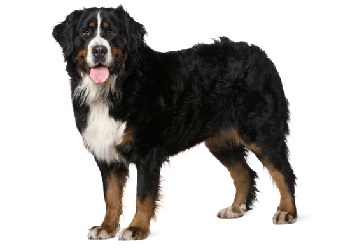 Originating from the canton of Berne in Switzerland, Bernese Mountain Dogs were originally bred as farm dogs and were versatile working dogs with hardly any hunting instinct, tending not to roam from the farmer’s property.
Originating from the canton of Berne in Switzerland, Bernese Mountain Dogs were originally bred as farm dogs and were versatile working dogs with hardly any hunting instinct, tending not to roam from the farmer’s property.
They protected their own territory and developed a strong bond with their owners and the ability to drove cattle and retrieve lost animals. When farmers of this area began keeping their own herds of cows, their dogs adapted to pulling carts filled with produce to the local dairies.
It is thought the Bernese Mountain Dog originated from this area and was from a collective breed of large Alpine dogs, including the Rottweiler, Greater Swiss Mountain Dog and the Saint Bernard. This breed is strong and sturdy. It was not only used for herding, but for pulling carts and alerting the farmer to intruders.
Clever, good-natured and loyal with a strong desire to be a true companion, the Bernese Mountain Dog just wants to be a big part of your family.
Personality
Bernese Mountain Dogs are friendly, loyal and intelligent. They have a firm need to be part of the family. As a working dog they need to be given the opportunity to perform tasks and use their natural ability. However, once exercised they are more than happy to settle down with their owners.
Obedience training is important because they will grow to be large strong dogs that need to be trained to be good canine companions. They are big, physically powerful dogs who grow quickly, but mature slowly.
They have a tendency to be aloof but generally once introduced to strangers they are friendly and steady. If trained with positive reinforcement and consistency they make calm and reliable family pets.
The breed is not known for being overly energetic; however, they do require a good walk so that they do not become bored and destructive. They enjoy the contact with family members and integrate well with children and other animals.
Upkeep
Bernese Mountain Dogs have a striking tri-color coat that’s long, silky and wavy. Because they were originally bred in cold climates, the coat can be thick, but regular grooming will keep this under control.
In warmer climates, they need protection from the sun and water, although they do cope well if left inside the house during the summer months. Regular grooming will minimise the amount of hair around the house. If desired, you can also clip their coats.
They also shed and won’t suit people with allergies. Daily exercise and stimulation is critical – a walk of 30 to 40 minutes in the cool of the day is ideal.
Like all dogs, Bernese Mountain Dogs require regular tick, flea, intestinal worms and heartworm treatments. Consult your veterinarian on treatment options. Desexing and vaccination against diseases, such as the deadly parvo virus and highly infectious canine cough, are also important to discuss with your vet.
Compatibility
Bernese Mountain Dogs make wonderful family pets as they readily accept small children and other animals. They are not suited to the jarring associated with constant jogging.
Whilst this is a large breed, they cope well with the suburban backyard as long as they receive regular exercise and are in contact with their owners.
Fact file
Breed classification Utility
Size Large
Origin Switzerland
Lifespan 7-9 years
Colors Black, white and rust
Cost $2000
Common hereditary problems Hip Dysplasia, Elbow Dysplasia, Bloat, Histiocytosis, Von Willenbrand Disease, Sub-aortic Stenosis, eye problems and skin conditions.
